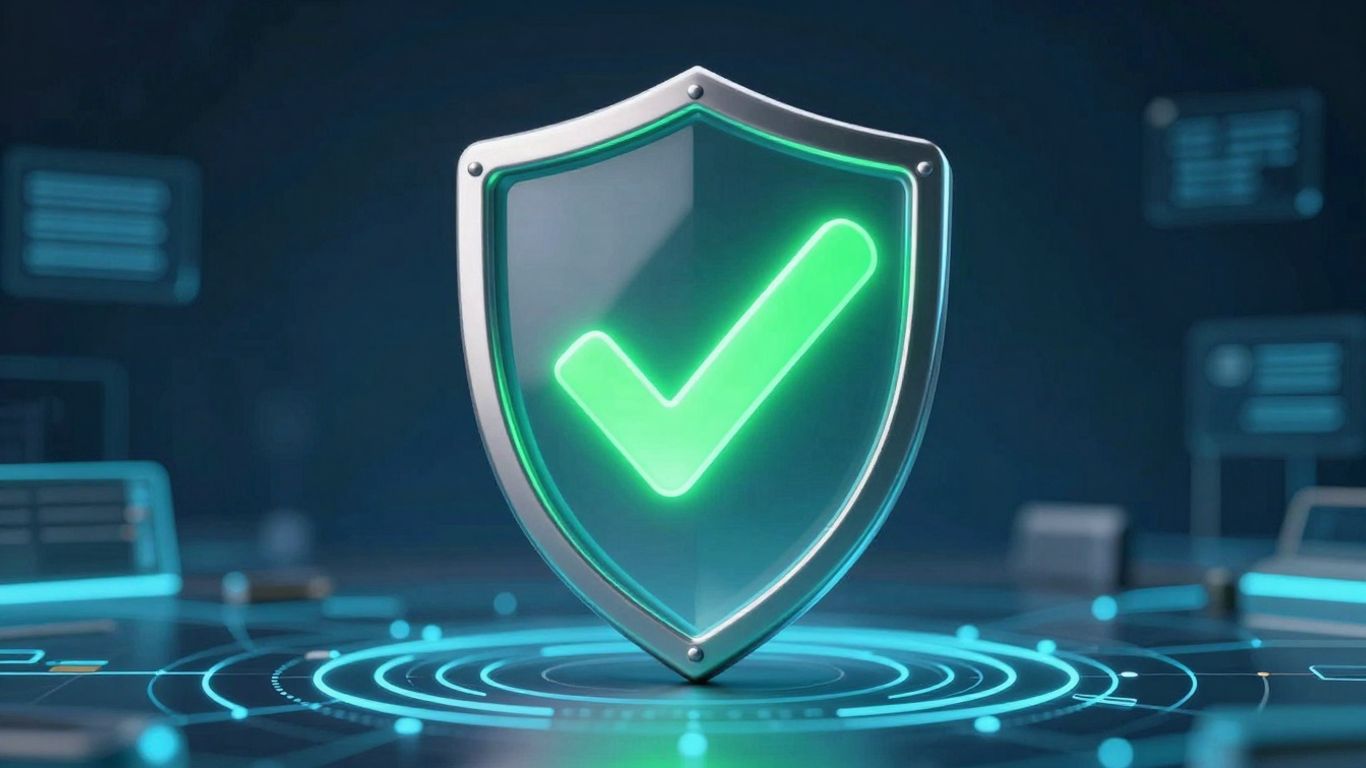[ newsletter ]
Stay ahead of Web3 threats—subscribe to our newsletter for the latest in blockchain security insights and updates.
Thank you! Your submission has been received!
Oops! Something went wrong. Please try again.
Discover the essential role of a security auditor in today's digital world. Learn how they mitigate risks, ensure compliance, and enhance your organization's security posture.





In today's world, where everything is online, keeping our digital stuff safe is a big deal. Cyber threats pop up all the time, so companies really need to check their defenses regularly. This is where a security auditor comes in. Think of them as the digital security guards who make sure everything is locked down tight. We'll look at why having a security auditor is so important for keeping your business safe and sound.

Think of a security auditor as the person who checks if all the locks on your digital doors and windows are actually working, and if you've even remembered to lock them in the first place. Their main job is to look at all the security measures a company has in place – things like firewalls, passwords, how people access information, and all the rules about who can see what. They're not there to fix things themselves, but to give an honest, outside look at whether the security setup is doing its job. This independent review is key because it helps leadership see the real picture, not just what the IT team hopes is happening. They check if the company is following its own security rules and if those rules are even good enough for today's threats.
It's easy to mix up security audits and vulnerability assessments, but they're different. A vulnerability assessment is like a detective looking for specific weak spots – maybe an old piece of software that hasn't been updated, or a system that's easy to guess the password for. They find the holes. A security audit, on the other hand, is broader. It looks at the whole security system, like checking if the detective even has a good process for finding holes, if the company is using the detective's reports, and if the company has a plan for what to do once a hole is found. It's about the overall security health and whether the right procedures are in place and being followed.
When an auditor finds a problem, they're not just pointing fingers. Their role is to help reduce the chances of something bad happening. They look at what could go wrong – like a data breach or a system outage – and figure out how likely it is and how bad it would be. Then, they suggest ways to make those risks smaller. This could mean recommending better training for employees, updating old software, or changing how access to sensitive data is managed.
Ultimately, a security auditor acts as a vital check and balance. They provide objective feedback that helps organizations move from simply reacting to security problems to actively preventing them, making the entire digital environment safer for everyone involved.
Think of it like this: you wouldn't wait for your house to get broken into before checking if your doors are locked, right? The same idea applies to digital security. Security audits are all about finding those weak spots before someone else does. It’s way cheaper and less stressful to fix a leaky faucet before it floods the basement. The same goes for your company's data. By regularly checking systems, networks, and software, auditors can spot potential entry points for attackers. This means looking at things like outdated software, weak passwords, or misconfigured firewalls. Getting ahead of these issues stops problems before they even start.
Not all security problems are created equal. Some are like a small crack in the wall, while others are a gaping hole. A good auditor knows how to tell the difference. They help figure out which vulnerabilities are the most dangerous, the ones that could cause the biggest headache if exploited. This helps businesses focus their limited time and resources on fixing the most critical stuff first. It’s about making smart choices, not just fixing everything.
Here’s a quick look at how risks might be ranked:
Audits provide a clear picture of where the real dangers lie, allowing for targeted improvements rather than a scattershot approach. This data-driven method makes security efforts much more effective.
When audits happen regularly, it sends a message throughout the company: security matters. It encourages everyone, from the top brass down to the newest intern, to think about security in their day-to-day work. This shift from reacting to problems to actively preventing them is a game-changer. It means people are more likely to follow security rules, report suspicious activity, and generally be more careful with sensitive information. Building this kind of awareness is key to digital risk protection.
Staying on the right side of the law and industry rules isn't just good practice; it's often a requirement. Security auditors play a big part in making sure organizations tick all the right boxes when it comes to regulations and standards. It’s not just about avoiding trouble, though that’s a big part of it. It’s about building a foundation of trust and reliability.
Lots of businesses today handle sensitive information, whether it's customer data, employee records, or proprietary company details. Laws like GDPR and others dictate exactly how this data must be protected. An auditor checks if the company's systems and processes line up with these rules. This means looking at how data is collected, stored, used, and eventually deleted. Failing to meet these mandates can lead to hefty fines and serious damage to a company's reputation. Auditors help identify where the company might be falling short, pointing out specific areas that need attention to get back in line with requirements like those found in data protection laws.
Beyond general data protection, many industries have their own set of rules. Think about healthcare with HIPAA, or finance with PCI-DSS. These aren't just suggestions; they are often legally binding. A security auditor familiar with these specific industry standards will examine the organization's security posture to confirm it meets these particular demands. This might involve:
Ignorance of the law isn't a defense, and that applies to cybersecurity regulations too. Non-compliance can result in significant financial penalties, legal battles, and a loss of business licenses. Security audits act as a proactive measure, catching potential compliance issues before they become major problems. They provide a clear picture of the organization's adherence to relevant laws and standards, allowing for corrections to be made. This preventative approach saves money and headaches down the line.
The digital world moves fast, and staying compliant with all the rules can feel like a moving target. Auditors bring a structured approach, using established frameworks to check if everything is in order. They don't just look at the technology; they also examine the policies and procedures people follow, because often, human error is a big factor in compliance failures.

Think of your security policies and how you handle problems when they pop up. Are they just dusty documents on a shelf, or do they actually work when things go wrong? A security auditor looks closely at these things.
Auditors check if your current security rules make sense and if they're actually being followed. It's not just about having rules; it's about making sure they're practical and keep up with new dangers. They might find that your password rules are too weak, or maybe nobody is really checking if people are locking up their computers when they step away. It’s like finding out your front door lock is loose – you wouldn't wait for a break-in to fix it, right?
Auditors help turn vague ideas about security into concrete actions that actually protect the company.
When a cyber incident happens, how does your team react? Do they know who to call, what steps to take, and how to stop the problem from getting worse? Auditors can test your incident response plan, sometimes by running practice drills. This helps find out where the plan falls short before a real emergency hits. It’s better to find out your fire alarm doesn't work during a drill than during an actual fire.
What happens after a cyberattack? Can your business get back up and running quickly? Auditors look at your backup systems and recovery plans. They want to make sure you can restore your data and operations with minimal disruption. This means checking if backups are actually working, if they're stored safely, and if your team knows how to use them to get things back online fast.
When we talk about governance, we're really talking about how an organization is directed and controlled. In the digital world, this means making sure that IT and security decisions align with the company's overall goals and that there are clear lines of responsibility. This is where the security auditor steps in, acting as a key player in making sure everything runs smoothly and securely.
Think of security controls like the locks on your doors and windows. An auditor checks if those locks are actually working, if they're the right kind of locks for the situation, and if people are actually using them correctly. They look at things like firewalls, access permissions, and data encryption to see if they're doing their job. This isn't just about ticking boxes; it's about making sure the defenses are solid and up-to-date. They might create a table to show where things stand:
It's easy for internal teams to develop blind spots. They're in the thick of it every day, and sometimes they might overlook something or assume a process is working when it's not. The security auditor provides an outside, unbiased look. They don't have a stake in whether a particular system was implemented or not; their only job is to report on whether things are secure and compliant. This independent view is super important for leadership to get a true picture of the security situation. It helps them make smart decisions about where to put resources and what needs fixing.
The auditor's report isn't just a document; it's a tool that helps the board and executives understand the real risks and make informed choices about the company's digital safety. Without this independent check, it's like driving a car without a dashboard – you might be moving, but you don't really know how fast or if you're about to run out of gas.
Auditors don't just show up, point out problems, and leave. They work with the IT security teams and company leaders. This collaboration is key. Auditors can help IT teams understand what the business needs are and how security fits into that. They can also explain to leadership why certain security measures are necessary, even if they seem like an extra cost or hassle at first. It's about building a shared understanding and working together to create a security strategy that actually works for the entire organization. This teamwork helps ensure that security isn't just an IT problem, but a company-wide priority.
When your company goes through a security audit, it's not just about checking boxes for compliance. It's a really big deal for how people see your business. Think about it: customers are handing over their personal information all the time. They want to know it's safe, right? A good audit shows them you're serious about protecting their data.
Customers are more aware than ever about data breaches. When they hear about a company getting hacked, it’s a huge red flag. So, when you can point to regular security audits, it tells them you're actively working to keep their information secure. It’s like showing them a report card that says, "We passed!" This builds a sense of reliability. This proactive approach is key to keeping customers happy and loyal. It means they can trust you with their sensitive details without constant worry.
Going through an audit means you're willing to have an outside party look at your security systems. This shows you're not just saying you have good security; you're proving it. It’s a way to show you're playing by the rules and aiming for the best practices out there. This commitment can be a big selling point.
Here’s what a good audit process often involves:
Your company's reputation is everything. A security breach can cause massive damage, and it's hard to recover from that kind of bad press. Regular audits help prevent these disasters. By identifying and fixing problems early, you avoid the kind of public failure that can really hurt your brand. It’s about being responsible and showing everyone that you value integrity. For more on how to conduct these checks, you can look into digital security audit practices.
Being transparent about your security efforts, backed by independent audits, creates a strong foundation of trust. It's not just about preventing attacks; it's about building a reputation as a secure and dependable organization in a world where digital safety is paramount.
The digital world doesn't stand still, and neither do the people trying to break into systems. What was a strong defense last year might be a leaky sieve today. That's why security auditors have to keep their eyes on the horizon. It's not just about checking boxes; it's about understanding the new tricks cybercriminals are pulling. Think of it like this: you wouldn't use a flip phone to navigate today, right? Same idea applies to security. We need to constantly update our understanding of what's out there.
Because the threats change, the people spotting them need to change too. Auditors can't just rely on what they learned in school or even last year. They need to keep learning. This means getting new certifications, attending workshops, and reading up on the latest attack methods. It’s like a doctor needing to stay current with medical advancements. Without it, they're just not as effective.
We're not just talking about new threats; we're also talking about new tools to fight them. Auditors are starting to use things like artificial intelligence and machine learning. These tools can sift through massive amounts of data way faster than a person ever could, spotting weird patterns that might signal trouble. It's about making the audit process smarter and quicker, so we can catch problems before they become big headaches.
The goal isn't just to find problems that already happened. It's about building systems that are tough enough to handle what's coming next. This means auditors need to be forward-thinking, not just reactive. They're part of making sure the whole organization is ready for whatever the digital future throws at it.
So, we've talked a lot about why having someone check your digital security is a really big deal these days. Threats are always popping up, and just hoping for the best isn't really a plan. A good security auditor, whether they're part of your team or brought in from the outside, acts like that extra set of eyes. They help find the weak spots before someone else does, making sure your company stays safe and sound. It's not just about following rules; it's about keeping your information, your customers, and your business out of trouble. Think of it as regular maintenance for your digital house – you wouldn't skip it, right? Keeping up with these checks means you're ready for whatever comes next.
Think of a security auditor like a detective for computer systems. They carefully check all the security rules and tools a company uses to make sure they are strong enough to keep bad guys out. They look for weak spots that someone could use to steal information or cause trouble and then tell the company how to fix them.
Looking for problems, like a 'vulnerability assessment,' is like finding specific holes in a fence. A security audit is bigger; it's like checking the whole fence, the gate, the locks, and even the guard dogs to make sure everything works together to keep the property safe. It checks the overall security plan, not just individual weak points.
Audits help businesses find and fix problems *before* hackers can use them. It's like going to the doctor for a check-up to catch illnesses early. This helps keep important information safe, follow important rules, and avoid getting into trouble with the law or losing customers' trust.
Yes, definitely! Many laws require companies to protect customer information. An auditor checks if the company is following these rules. If they aren't, the auditor helps them fix it so they don't have to pay big fines or face legal issues.
Audits look at how a company plans to handle a cyberattack. They help make sure the plan is good and that people know what to do if their systems get attacked. This means the company can get back to normal faster and with less damage if a cyber incident occurs.
Absolutely! When a company shows it takes security seriously by having regular audits, customers and partners feel more confident that their information is safe. It's like a restaurant showing you their clean kitchen – it builds trust and makes you feel better about eating there.


